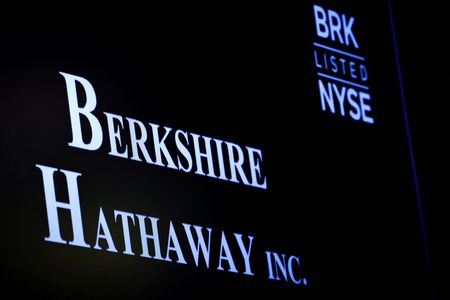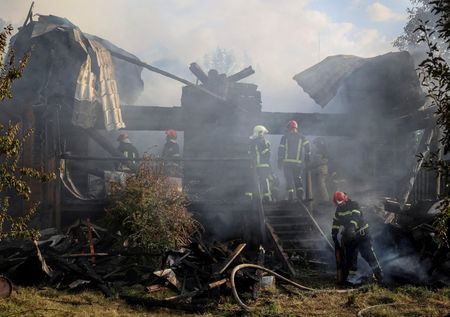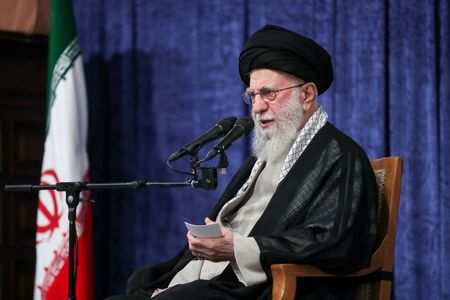By Jonathan Stempel
OMAHA, Nebraska (Reuters) – Berkshire Hathaway has held up well in a rocky year for stocks, and shareholders this weekend will be seeking reassurance from Warren Buffett that they remain in good hands as tariff turmoil disrupts corporate America.
At Saturday’s annual meeting in Omaha, Nebraska, the 94-year-old billionaire will mark 60 years in charge of what he built into a $1.15 trillion conglomerate.
Buffett will spend 4-1/2 hours fielding shareholder questions, which typically focus on Berkshire’s operating businesses, markets, the economy, life lessons, and the company’s future after the Oracle of Omaha departs.
Berkshire’s businesses are disparate, and include Geico insurance, the BNSF railroad, Berkshire Hathaway Energy, Dairy Queen, Fruit of the Loom, and retro brands such as Ginsu knives and the World Book Encyclopedia.
For many, they serve as a proxy for the American economy.
Yet through April 30, Berkshire shares have trounced the Standard & Poor’s 500, rising 18% while the index was down 5%.
That gulf, however, is more likely reflective of whipsaw from U.S. President Donald Trump’s policies than new attitudes about Berkshire itself.
Some observers view Berkshire’s $334.2 billion year-end cash stake, which at current yields could generate more than $14 billion of income, as a buffer.
“People have so much conviction in Warren Buffett and his ability to deploy capital well in market downturns,” said Brett Gardner, author of “Buffett’s Early Investments,” focusing on decades ago when Buffett’s outperformance was substantial.
“Berkshire also has a lot of stable cash flowing businesses that may not be as impacted as other companies,” he added.
The early outperformance fueled much of Berkshire’s stock price gain of more than 6,400,000% since 1965. Over multiyear periods, Berkshire now performs more like the S&P, but with better downside protection.
TARIFF PRESSURES
Buffett readily acknowledges the folly of expecting stellar outperformance over the long haul.
“We cannot do as well as we did in the past,” Buffett said at Berkshire’s 2013 annual shareholder meeting. “It’s tougher as we get bigger.”
At the 2021 meeting, Buffett said a person who knows nothing about stocks and had no “special feelings” for Berkshire should buy the index.
And in his February 2024 shareholder letter, Buffett said Berkshire “should do a bit better” than average American companies, with materially less risk of losing capital, but that anything beyond “slightly better” was “wishful thinking.”
A large driver of Berkshire’s profit is insurance, which accounted for 48% of its $47.4 billion of operating profit last year.
Still, earnings in 53% of Berkshire’s 189 operating businesses fell last year, and Trump’s tariffs could pressure some of the businesses.
At BNSF, for example, higher tariffs could reduce cargo volumes if imports decline.
Not even buying and selling homes is immune.
“Tariffs indirectly affect our business, to the extent they cause market instability and affect the 10-year Treasury note, which directly affects mortgage rates and the housing market,” said Chris Kelly, chief executive of HomeServices of America, the largest U.S. residential real estate brokerage.
‘DUMBEST STOCK I EVER BOUGHT’
Berkshire’s value also derives from its huge cache of stocks, including Apple and American Express, though that portfolio suffered during April’s market selloff.
Jim Shanahan, an Edward Jones & Co analyst in St. Louis, said Berkshire has been trading near a historically high 1.75 times projected book value for June.
“We’ve always felt Berkshire was a good stock to own in periods of market volatility,” he said, “but we didn’t anticipate this level of market volatility.”
Buffett took over Berkshire in a fit of anger in 1965, when management of the then-flailing textile company shortchanged him when he offered to sell back his shares.
He later called Berkshire “the dumbest stock I ever bought,” saying he missed out on $200 billion over 45 years by making it his vehicle to invest in insurance instead of starting a new entity.
But by adopting the mantra of the company’s late vice chairman, Charlie Munger, to buy wonderful businesses at fair prices, rather than fair businesses at wonderful prices, Buffett made Berkshire what it is today.
Gardner called Berkshire’s size its “biggest handicap, being unable to move the needle,” but said Buffett’s record as perhaps the greatest investor ever outweighed it for many.
PLANNING FOR THE FUTURE
Succession-planning is largely set. Vice Chairman Greg Abel, who oversees non-insurance businesses, has since 2021 been Buffett’s designated successor as chief executive officer.
It is unclear whether Abel or portfolio managers Ted Weschler and Todd Combs, who is also Geico CEO, would become the chief stock pickers. Buffett’s son Howard Buffett would become nonexecutive chairman.
Abel and Vice Chairman Ajit Jain, who oversees insurance businesses, will also field shareholder questions on Saturday.
Shanahan said he hopes Abel will commit to investing more of his net worth in Berkshire, and assure investors that he will be around at least a decade. “A lot of people think of retiring at 62,” Shanahan said.
But he particularly wants to know if April’s market swoon provided Buffett an opportunity to buy … something.
“That would go a long way to calming markets,” he said. “Consider the alternative: they go to $340 billion of cash and have been a net seller in April. That would be horrible for markets.”
(Reporting by Jonathan Stempel in Omaha, Nebraska; Editing by Megan Davies and Matthew Lewis)










